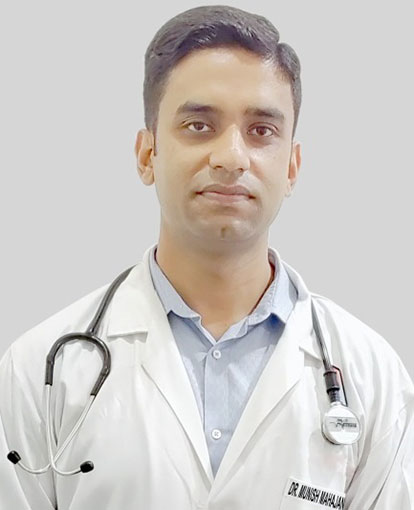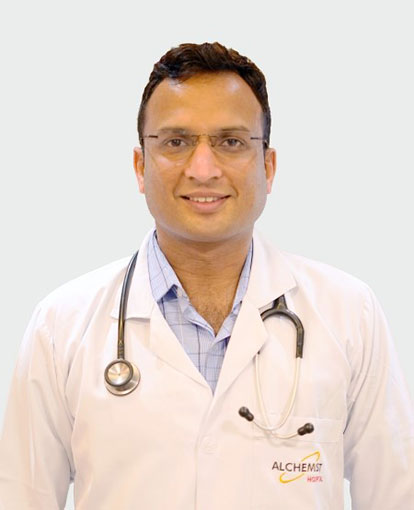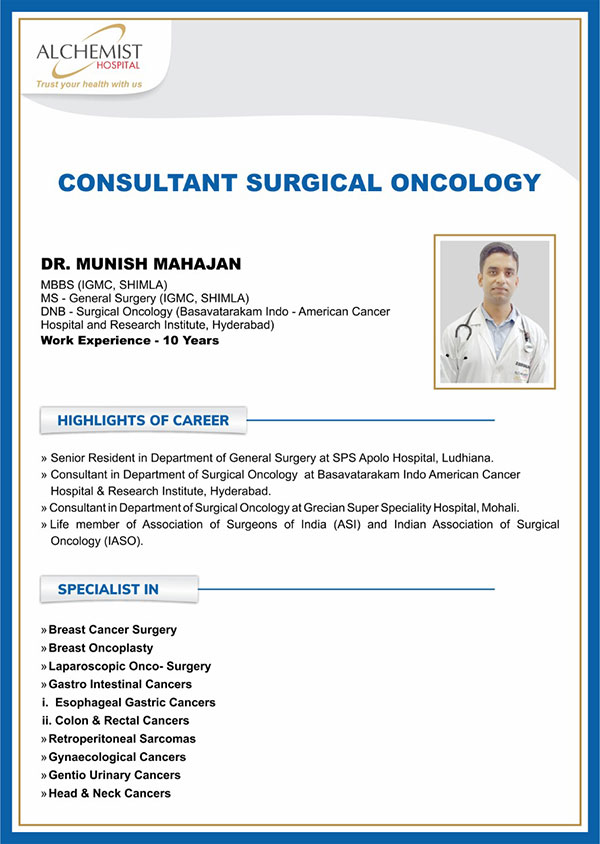SPECIALISTS
Oncology
The Department of Oncology comprises of facilities for surgery, chemotherapy, radiation and palliative care. We take an individualized, personalized approach to every patient. All the cases are discussed in tumour board and international guidelines for treatment are followed. The department also provides palliative/supportive care to patients with advanced stage of cancer. Various divisions of oncology department are:
Surgical Oncology
Surgery plays most important role in curing majority of cancers. The department of surgical oncology offers both outpatient and inpatient services for screening, diagnosis & treatment of cancer patients round the clock. The surgical procedures done are major Head & Neck resections, surgeries for GI cancer, Breast, Colorectal, Gynae malignancies & Uro-oncology. Being a multi-speciality hospital, patients of high risk & multiple comorbidities are managed under one roof. Our aim is to give excellent results and good quality of life to the patients.
The major surgical oncology surgeries performed are:
Head & Neck –
- Commando surgeries for oral cancers, laryngeal surgeries
- Neck dissection and thyroid surgeries.
- Salivary gland surgery (Radical Parotidectomy)
Breast – Breast conservative surgeries, Mastectomies (MRM) with reconstruction.
GI surgeries – All types of minimally invasive surgeries.
- Oesophagectomy
- Gastrectomy
- Radical cholecystectomies
- Liver resections
- Whipples operation / pancreatic surgeries
- Small Bowel resections
- Splenectomy
- Lower anterior resections
- Abdomino perineal resections
- Sigmoidectomies
- Total procto-colectomies
Gynae-Oncology :
- Ovarian laparatomies/ cytoreductive surgery
- Fertility preserving ovarian laparotomy in young & early cases
- Wertheim’s hysterectomies
- Retroperitoneal lymphnode dissection
Uro-Oncology:
- Radical nepherectomies
- Radical & partial cystectomies with all types of urinary diversion
- Radical prostatectomies
- Retroperitoneal lymphnode dissection
Soft tissue tumor:
- Limb salvage surgeries
- Amputation
Medical Oncology
This department has a well equipped cancer day care centre for preparing and administering cytotoxic drugs as per the international guidelines. Every patient is given personalized attention and care. The department also offers facilities for high dose chemotherapy.
Chemotherapy Day Care Unit
Chemotherapy Day Care Unit is dedicated to providing chemotherapy services for the management of cancer patients. Oncologists at our hospital often utilize chemotherapy, which uses systemic treatment in the form of intravenous injections of anticancer drugs or, less commonly, oral medications to kill cancer cells. We give all the facilities in day care unit which includes best nursing services, dietetics services and counselling for all Oncology patients.
Chemo Port
Chemo port is a Catheter (long, hollow plastic tube) connected to a plastic and metal reservoir. It is placed in the chest, the catheter tip will be in a large vein in the chest. The port itself will be under the skin of the chest, below your collarbone and above the breast tissue.
Purpose of a Port
A port can stay in place for months or even years, if needed. Certain drugs cannot be given through a standard IV, but they can be given through the port. Post have a lower risk of infection, it avoids multiple venous punctures for ongoing chemotherapy.
Radiation Therapy
Radiation therapy* treats cancer by using high energy to kill tumor cells. The goal is to kill or damage cancer cells without hurting healthy cells. Different people have different side effects with radiation. There may be little or only mild side effects from the treatment. The side effects are less with latest form of radiotherapy with high- end Linac machine.
Types of Radiotherapy-
- IGRT
- IMRT
- CONFORMAL RADIOTHERY
- PALLIATIVE RADIOTHERAPY
- BRACHYTHERPY
Facility available with a tie-up centre*






